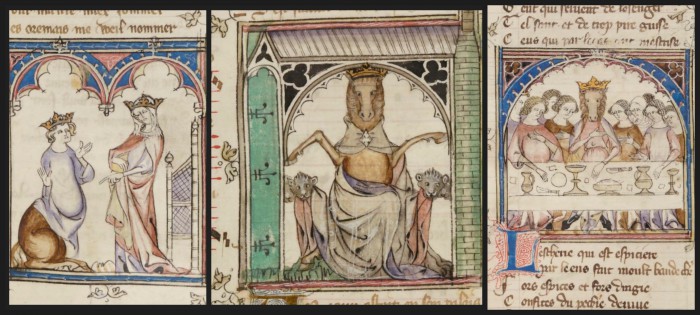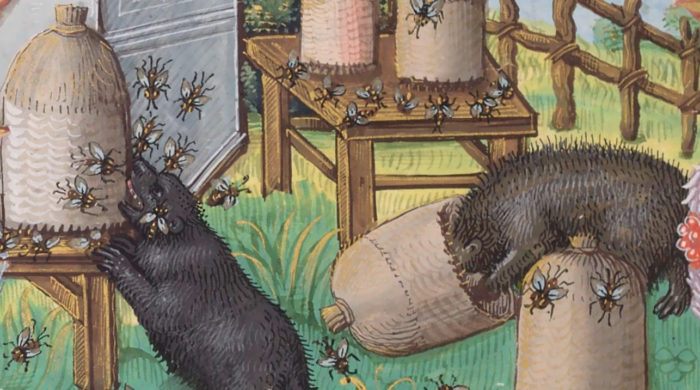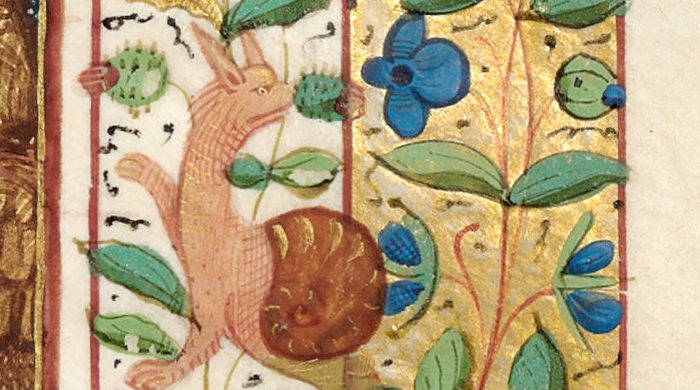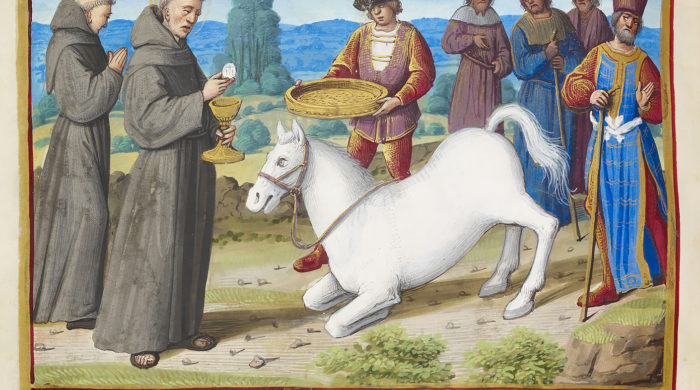IL RE ASINO
 FRANÇAIS 146
Manoscritto in carta con disegni colorati e lettere ornamentali, Bibliothèque Nationale de France, Francia, 1314.
La tavola indica un proverbio "Sulla Creazione del papa Jehan", che è rimasta in bianco.
Il poema francese Roman de Fauvel attribuito all'alto funzionario della corte reale di Gervais du Bois è del XIV secolo. Il Roman de Fauvel, pubblicato agli inizi nel 1314 è un racconto allegorico, critico nei confronti della dicotomia tra Chiesa e Stato, che si sviluppa attraverso la metafora di un asino divenuto padrone del suo padrone di casa in seguito ad un capriccio della dea Fortuna. In esso si trova la più antica attestazione letteraria del rito del charivari.
Il poema, benché bandito perché eretico e sedizioso, ebbe un grandissimo successo e fu ricopiato fino al XV secolo e sono sopravvissuti dodici manoscritti in buone condizioni grazie al fatto che, essendo illegale, le copie erano gelosamente conservate.
Il Roman de Fauvel è carico di satira politica e di allegorie. Lo stesso nome dell'asino, infatti, è intriso di più significati: sillabato diventa fau-vel (che significa menzogna velata) e le sue lettere formano un acrostico in cui ogni lettera si riferisce ad uno dei sette vizi capitali.
FRANÇAIS 146
Manuscript in paper with coloured drawings and ornamental lettersa, Bibliothèque Nationale de France, 1314.
This piece deals with the proverb "On the Creation of the pope Jehan", which is still empty.
The french poem Roman de Fauvel confered to the high official of the royal court of Gervais du Bois is of the XIV century. The Roman de Fauvel, published at first in the 1314, is an allegorical story, critical towards the dichotomy between Church and Government, which develops through the metaphor of a donkey, which became master of its home-master after a tantrum of the Lucky Goddess. In it we find the most ancient literary statement of the charivari's ritual.
The poem, although it was outlawed because heretical and mutinous, had a great success and copied until the XV century and 12 manuscripts survived in good conditions thanks to the fact that, being illegal, its copies had been preserved jealously.
The Roman de Fauvel is rich of satirical politics and of allegories. The same name of the donkey, indeed, is full of many meanings: syllabified, it becomes fau-vel (which means "veiled lie") and its letters compose an acrostico in which every letter refers to one of the seven deadly sins.
FRANÇAIS 146
Manoscritto in carta con disegni colorati e lettere ornamentali, Bibliothèque Nationale de France, Francia, 1314.
La tavola indica un proverbio "Sulla Creazione del papa Jehan", che è rimasta in bianco.
Il poema francese Roman de Fauvel attribuito all'alto funzionario della corte reale di Gervais du Bois è del XIV secolo. Il Roman de Fauvel, pubblicato agli inizi nel 1314 è un racconto allegorico, critico nei confronti della dicotomia tra Chiesa e Stato, che si sviluppa attraverso la metafora di un asino divenuto padrone del suo padrone di casa in seguito ad un capriccio della dea Fortuna. In esso si trova la più antica attestazione letteraria del rito del charivari.
Il poema, benché bandito perché eretico e sedizioso, ebbe un grandissimo successo e fu ricopiato fino al XV secolo e sono sopravvissuti dodici manoscritti in buone condizioni grazie al fatto che, essendo illegale, le copie erano gelosamente conservate.
Il Roman de Fauvel è carico di satira politica e di allegorie. Lo stesso nome dell'asino, infatti, è intriso di più significati: sillabato diventa fau-vel (che significa menzogna velata) e le sue lettere formano un acrostico in cui ogni lettera si riferisce ad uno dei sette vizi capitali.
FRANÇAIS 146
Manuscript in paper with coloured drawings and ornamental lettersa, Bibliothèque Nationale de France, 1314.
This piece deals with the proverb "On the Creation of the pope Jehan", which is still empty.
The french poem Roman de Fauvel confered to the high official of the royal court of Gervais du Bois is of the XIV century. The Roman de Fauvel, published at first in the 1314, is an allegorical story, critical towards the dichotomy between Church and Government, which develops through the metaphor of a donkey, which became master of its home-master after a tantrum of the Lucky Goddess. In it we find the most ancient literary statement of the charivari's ritual.
The poem, although it was outlawed because heretical and mutinous, had a great success and copied until the XV century and 12 manuscripts survived in good conditions thanks to the fact that, being illegal, its copies had been preserved jealously.
The Roman de Fauvel is rich of satirical politics and of allegories. The same name of the donkey, indeed, is full of many meanings: syllabified, it becomes fau-vel (which means "veiled lie") and its letters compose an acrostico in which every letter refers to one of the seven deadly sins.
Post consigliati
World Bee Day
Si celebra oggi, 20 maggio, la Giornata mondiale delle api: Folia Magazine si unisce…
Bestie Floreali
Miniatura tratta da un Libro d'Ore in latino e francese, ms. 434 réserve,…
Sant’Antonio di Padova
Ricorre oggi la festa di uno dei santi più famosi: la Chiesa celebra infatti sant'Antonio di…


